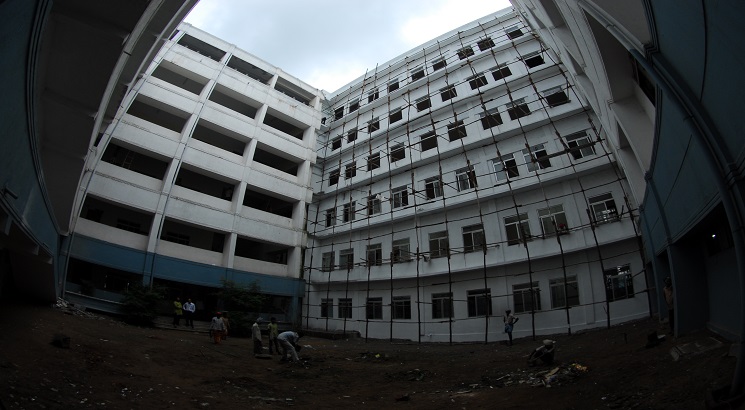TN, Telangana teachers file PIL in SC against AICTE faculty student ratio
Abhay Anand | March 1, 2018 | 05:49 PM IST | 4 mins read

NEW DELHI, MARCH 1: The Private Educational Institutions Employees Association (PEIEA) of Tamil Nadu, (along with other self-financing college teachers’ associations of Telangana) have filed a PIL for stay and withdrawal of AICTE’s new faculty-student ratio of 1:20.
The PIL against the Approval Process Handbook 2018-19 released by Council has been listed for hearing on March 9. The Petitioners have claimed that the said handbook violates the Fundamental Rights of 1.78 lakh professors working in private technical institutions across the nation as they would lose their jobs with the new faculty-student ratio formula.
The loss of 1.78 lakh teaching posts
Prior to the release of the new Handbook, the ratio was 1:15 in private and self-financing engineering colleges for B.E/B.Tech/B.Arch, MBA, MCA, Hotel management and 1:20 for Diploma. As per the PIL, the faculty-student ratio of 1:15 for Engineering & Technology and other programs such as MBA, MCA, HMCT, M.Pharm has been irrationally decreased to 1:20. For diploma the earlier 1:20 ratio was converted into 1:25.
The total numbers of jobless professors after implementation of new ratios in all AICTE monitored courses such as diploma, engineering (UG/PG), Hotel Management, MBA, MCA, Pharmacy shall be around 1.78 lakh, with nearly one lakh in private engineering colleges alone.
As per K. M. Karthik, President, PEIEA, who is Petitioner No. 3, “It is stated that the new faculty-student ratio is not only going to create a defective education system but is also going to be liable for a loss of a massive amount of intra-national brain drain. Students presently opting for B.E/B.Tech or other technical education will not opt for it in future due to the scarce quantity of teachers at engineering colleges. These students will opt for science and arts degrees, which cannot develop and stimulate the knowledge of students similar to the level of engineering or other technical education. Naturally, as a result of this anticipated downfall, the youth shall lose in global competition and nation shall also lose many crores of its technically qualified human resource.”
The teachers have also claimed that the professors who are retained are also going to come under the thumb of the management of private institutions and shall be intimidated to work for less salary by pointing at the 1.78 lacs professors who are rendered jobless by these new ratios.
The Ghost Conundrum
There are almost 3000 self-financing/private engineering colleges in the nation employing close to 3.7 lakh teachers. The teachers are claiming that most of them are just allowed to start and run at will during the last one and half decade. Even under this prevailing scenario the trusts operating self-financing colleges are increasing the fees received from students and reduce the salaries earned by professors.
“The educational institutions feel the business will not yield the same old profit margin and decided to wind the business and move on to other businesses. Before the educational trusts could exit the business, the AICTE indirectly helps the trusts to reap good profit by implementing a great reduction in the number of professors,” said a source close to the development.
He further said that to meet the requirements of affiliations and inspections, several private engineering colleges are in the practice of appointing fake staff members. The private institutions are not even following the earlier ratio of 1:15.
The HRD Minister at the release of the All India Survey on Higher Education 2016-17 Report had disclosed that introduction of Aadhaar revealed 80,000 ‘ghost’ teachers in various colleges and universities across the country. Prakash Jabadekar said, “……..There are certain 'ghost' teachers who use proxy methods and are apparently teaching at multiple places as full-time employees. After the introduction of Aadhaar, 80,000 such teachers have been identified and action will be taken against them….”
Abhishek Yadav, Advocate in the case said, “If 80,000 faculties are fake then the real numbers of staff employed may be much lesser than the required numbers imposed by AICTE. If AICTE did not have any mechanism to curb the malpractice only watch it happen then the new ratio too cannot be implemented by AICTE. AICTE’s acceptance of a malpractice and facilitating the erring institutes is totally illegal. The new ratio will totally diminish the presence of faculties at every institute, and now students meeting a faculty may become a scarce event just like a student meeting the principal or a director of the institute.”
The Petitioners have contended that in implementing new faculty-student ratios, AICTE had broken the transparency that it followed all these years. The manner in which AICTE implemented the new ratios remain concealed and without the participation of professors, students, parents, and public. The matter was not released in public domain prior to deciding and thrust over the society in an autocratic manner. AICTE had acted on the advice of associations of college managing trusts. “Every trust in no more a non-profitable service organization, and largely a money churning family owned organization. Some AICTE’s officials had acted in nexus with these trusts making a secret society, and the new draconian faculty-student ratios are only a result of the meetings in these secret societies,” they alleged.
It is being claimed that the AICTE cannot claim that decreasing staff numbers will improve the financial stability of an institute when AICTE’s role and the objective is to coordinate and improve the quality of education. AICTE cannot claim the financial condition of an institute is dull when it is ever increasing the fee structure of students.
Follow us for the latest education news on colleges and universities, admission, courses, exams, research, education policies, study abroad and more..
To get in touch, write to us at news@careers360.com.